
Cholesterol
Know your numbers. Take action to stay healthy.
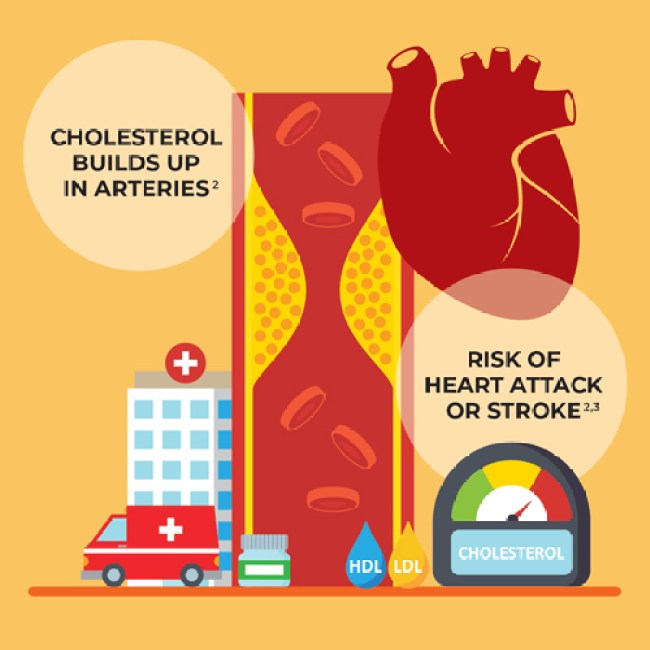
What is cholesterol?
Cholesterol is a waxy, fatty substance that your body needs to stay healthy, but when there is too much of it in the blood, it can cause health problems, as it starts to build up on the walls of the arteries. 1,2,3
Over time, this build-up, called plaque, causes hardening and narrowing of the arteries so that blood flow is slowed down or blocked. 2
If a blood clot forms and blocks one of these narrowed arteries, a heart attack or stroke can result. 3
How does cholesterol affect you?
Cholesterol gradually builds up in the arteries which lessens or may eventually block the flow of blood. 1
High cholesterol is one of the major risk factors for developing heart disease and having a heart attack or stroke. 2,4
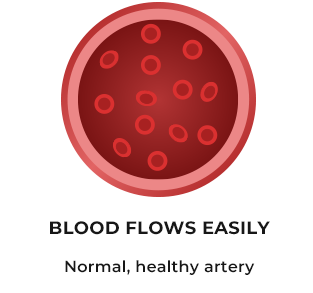
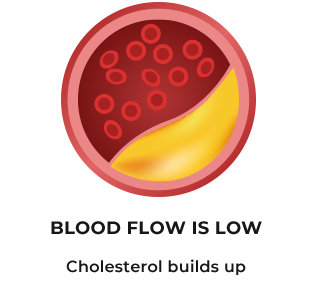
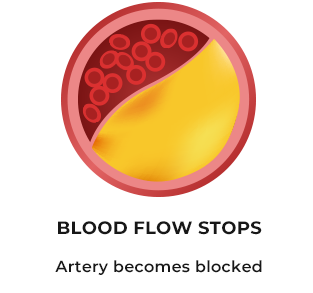

Where does cholesterol come from?
The liver makes about 75 % of the body’s cholesterol. The other 25 % comes from the food you eat. 5
Some people inherit genes from their parents that increase their cholesterol levels (i.e. familial high cholesterol). 1,4,6
Good versus bad
Low levels of ‘good’ cholesterol, as well as high levels of ‘bad’ cholesterol increase the risk for heart attack and stroke. 2,6
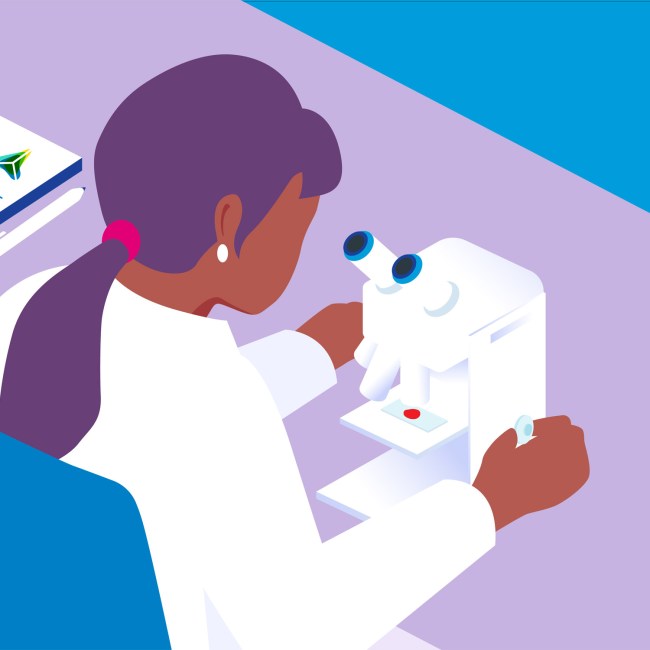
Get your cholesterol checked
To check your cholesterol levels, your doctor can perform a blood test called a “lipoprotein profile”, which is usually done after a 9 to 12 hour fast and will provide information about your:
Total cholesterol | LDL (bad) cholesterol | HDL (good) cholesterol | Triglycerides 2
The test report will show your cholesterol levels in millimoles per litre (mmol/L) of blood. 6
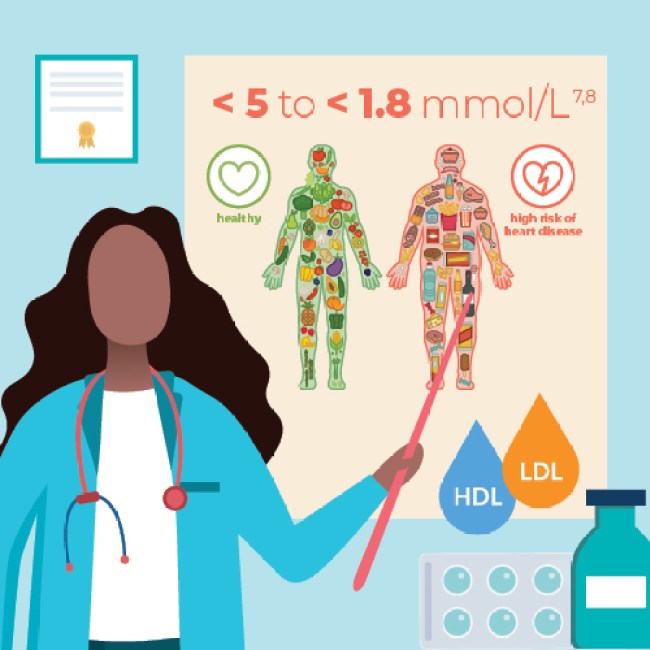
Know your numbers
High cholesterol itself does not cause any symptoms, so many people are unaware that their cholesterol levels are too high. 2
Are you at high risk for a heart attack or stroke?
Very high-risk individuals include those with: 6
In addition to high cholesterol, there are several other factors that can increase the risk of heart disease: 6,9
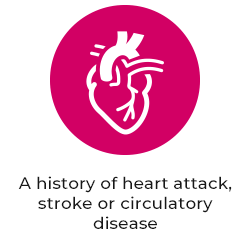
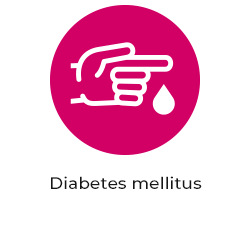
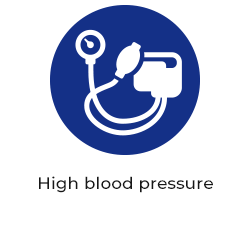
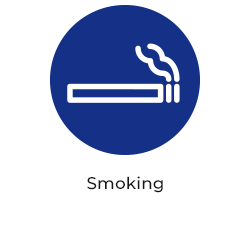
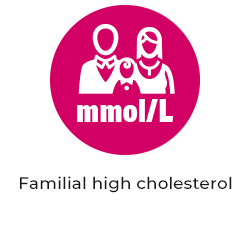
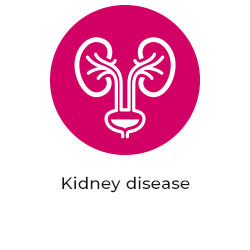
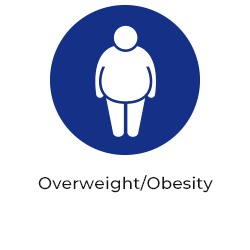
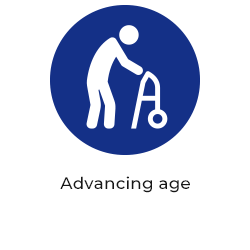
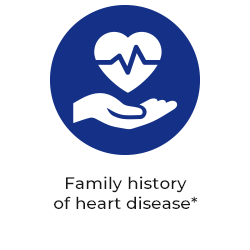

*(male before 55 years of age; female before 60 years of age)
How can cholesterol be lowered?

LIFESTYLE CHANGES
Unhealthy cholesterol levels can almost always be lowered with a combination of diet, weight loss, exercise and medication. [4]

HEALTH BENEFITS
As cholesterol levels fall, so does the risk of developing heart disease, suffering a heart attack or having a stroke. [4]

START TODAY
It is not too late if heart disease is already present because cholesterol-lowering at any stage, will lower your risk. [4]

Lowering high cholesterol is important for people of all ages, with and without established heart disease 2
Healthy food choices can help manage cholesterol [10]
Limit saturated fats and trans fats [10]
- Foods high in saturated fats include fatty meat, chicken skin, processed meats, bacon, sausages, butter, cream, full-cream milk and some vegetable oils e.g. coconut and palm oil. 10
- Remove all visible fat before cooking and avoid deep frying food. 6
- Trans fats are in hard margarine, shortening, fried foods and packaged foods that are made using hydrogenated oils. 10
- Eat fewer baked goods e.g. biscuits, cakes, pastries. 10,11
Eat healthy fats (polyunsaturated and monosaturated) [2,6,11]
- Choose fat-free or low-fat dairy products, lean meats, skinless chicken and fish.
- Use soft tub margarines e.g. those approved by the Heart Foundation of South Africa.
- Cook with oils such as olive, sunflower, canola and peanut oil.
Limit the amount of cholesterol you eat [10]
- Foods high in cholesterol include egg yolks, organ meats, full-cream milk, cheese, butter and shrimp.
Eat more omega-3 fats (heart-healthy fats) [10]
- Aim to eat fish twice a week.
- Good choices include salmon, tuna and mackerel.
- Flaxseed is another source of omega-3 fats.
Eat more plant-based foods
- Use beans and soy foods for protein.10
- Eat at least 5 servings of fruits and/or vegetables daily.6
Replace all refined carbohydrates with food high in fibre [6,11]
- Avoid eating products made from white flour, such as white bread, biscuits, pizza, and refined/sweetened cereals.
- Eat more wholegrain foods such as oats, barley, crushed wheat, samp, brown rice, whole-grain breakfast cereals, health and seed breads.
Avoid foods that are high in sugar [6]
- Limit treats such as sweets, chocolates, fizzy drinks, fruit juices, flavoured and sweetened waters and low-fat sweetened milk drinks.
- Avoid adding sweeteners such as sugar, honey, syrup and fructose to your food and drinks.
If you consume alcohol, do so in moderation [6]
- Women should limit their intake of alcohol to 1 drink per day and men should have no more than 2 drinks per day.
Limit your intake of salt [6]
- Choose and prepare foods with little or no salt by using more herbs and spices.

It is a good idea to consult a registered dietician who can help you to achieve and maintain a healthy weight 10

Lifestyle changes can help reduce cholesterol levels
Besides eating a heart-healthy diet, everyone with high cholesterol should: 2,4,7
• Achieve and maintain a healthy weight.
• Exercise regularly (at least 30 minutes on all or most days of the week).
• Stop smoking.
The benefits of these lifestyle changes are usually noticed within 6 to 12 months, but the success rates do vary. Your doctor may recommend starting cholesterol-lowering medicines in conjunction with making these lifestyle changes.

Medicines used to lower cholesterol
There are many medicines available to help lower elevated cholesterol levels. Your doctor may prescribe a medicine, or a combination of medicines based on your cholesterol level and other individual factors. 4
To report an Adverse Event or Product Quality Complaint with a specific Organon product, please contact dpoc.zaf@organon.com.
REFERENCES
- Centers for Disease Control and Prevention (CDC). About Cholesterol. Available at: https://www.cdc.gov/cholesterol/about.htm. Accessed: December 2022.
- National Heart, Lung, and Blood Institute (NHLBI). National Cholesterol Education Program. High Blood Cholesterol. What you need to know. Available at: https://www.nhlbi.nih.gov/files/docs/public/heart/wyntk.pdf. Accessed: December 2022.
- American Heart Association (AHA). About Cholesterol. Available at: https://www.heart.org/en/health-topics/cholesterol/about-cholesterol. Accessed: December 2022.
- Rosenson RS. Patient education: High cholesterol and lipid treatment options (Beyond the Basics). Available at: https://www.uptodate.com/contents/high-cholesterol-and-lipid-treatment-options-beyond-the-basics/print. Accessed: December 2022.
- Scirica BM, Cannon CP. Treatment of Elevated Cholesterol. Circulation. 2005;111:e360-e363. Available at: https://www.ahajournals.org/doi/full/10.1161/CIRCULATIONAHA.105.539106. Accessed: December 2022.
- Klug EQ, Raal FJ, Marais AD, et al. South African dyslipidaemia guideline consensus statement: 2018 update. SAMJ. 2018;108(11)part2:975-1000.
- The Heart and Stroke Foundation South Africa. Cholesterol. Available at: http://www.heartfoundation.co.za/cholesterol/. Accessed: December 2022.
- Piepoli MF, Hoes AW, Agewall S, et al. 2016 European Guidelines on cardiovascular disease prevention in clinical practice. Eur Heart J. 2016;37:2315-2381.
- Rosenson RS. Patient education: High cholesterol and lipids (hyperlipidemia) (Beyond the Basics). Available at: https://www.uptodate.com/contents/high-cholesterol-and-lipids-beyond-the-basics. Accessed: December 2022.
- NHLBI-NIH. Your Guide to Lowering Cholesterol with TLC. December 2005. Available at: www.nhlbi.nih.gov/files/docs/public/heart/chol_tlc.pdf. Accessed: December 2022.
- Colditz GA. Patient education: Diet and health (Beyond the Basics). Available at: https://www.uptodate.com/contents/diet-and-health-beyond-the-basics. Accessed: December 2022.
ZA-EZE-110034 04/25